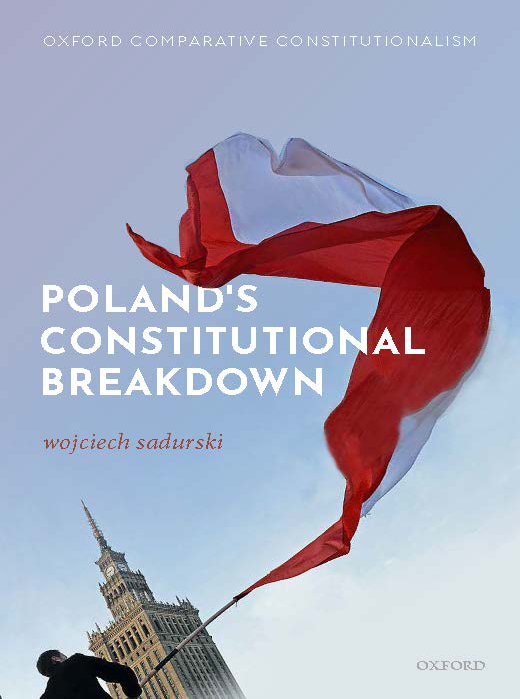Author Interview: Poland's Constitutional Breakdown
/Wojciech Sadurski
University of Sydney
Editors’ Note: Readers can receive a 30% discount using the flyer below:
Wojciech Sadurski- Poland’s Constitutional Breakdown flyer
Q1: Tell us a little bit about the book
Poland had been one of the most successful of the European states that embarked upon a democratic transformation after the fall of Communism. After joining the European Union, Poland has been held up as a model of a successful European democracy, with a reasonably consolidated state and well-protected individual rights. And yet, this all radically changed in 2015 when a populist party won both the presidential and parliamentary elections, and set about subjecting all independent institutions to the will of the executive. It paralysed the Constitutional Tribunal, packed the Supreme Court with the party faithful, and subjected electoral commissions to the government. My book describes the causes of this dramatic turn of events, and traces them partly to populist sentiments in Polish society and partly to the vulnerability of Poland’s institutions. But the picture is not totally grim: the book describes both the internal forces (civil society, media, independent judges) and external factors (in particular, various EU procedures) that may help reverse negative trends. It should be noted that it is the first book-length treatment of the Polish case worldwide.
Q2: What inspired you to take up this project?
The book was definitely inspired by current events in my home country, Poland. I had not planned to write it; in fact, I begun writing so much under the pressure of very upsetting developments in Poland that I had to interrupt another project of the book which was nearly 70-80 per cent ready.
Q3: Whose work was influential on you throughout the course of the project?
I really cannot identify anyone or any book in particular which influenced me in writing this particular book, But more generally I have been definitely influenced and inspired by the writings of such comparative constitutional lawyers as Bruce Ackerman, Ran Hirschl, Tom Ginsburg, Michel Rosenfeld, Sam Issacharoff, Alec Stone Sweet and Kim Lane Scheppele, many of whom happen to be (not coincidentally, I think) also my friends. More specifically, when it comes to Poland, I was influenced in my understanding of the events there by Polish constitutional scholars (and the first two of them, scholars/judges) such as Lech Garlicki, Mirosław Wyrzykowski, Marcin Matczak and Tomasz Tadeusz Koncewicz.
Q4: What challenges did you face in writing the book? (of method, of philosophy, of law, or just of life…)
My main challenge was reflective of any challenge facing an author writing a book (a book, rather than a short article) in the midst of the developments it describes and interprets. You know that every passing day, week and month will bring new important developments, and yet you want to produce a comprehensive account, and place a time limit somewhere, quite arbitrarily. It requires an artificial closure, so to speak. Otherwise, having to update the text all the time, you realize that you will never complete the book – and yet you believe that this book needs to be written. So I have adopted, for practical reasons, an arbitrary time limit of 1 November 2018 and told myself that I would not include in the book anything that has happened after that date. It was harsh, but I had to do it. I may need to produce an update in a year or so, and can even do it online, if the publisher likes the idea.
Q5: What do you hope to see as the book’s contribution to academic discourse and to constitutional or public law more broadly?
I hope to provide a case study in anti-constitutional, populist backsliding which is of interest also for people who know very little about, and/or are not particularly interested in, Poland. So this is a case study of a broader issue; an issue which has its manifestations in the United States and the Philippines, Italy and Hungary, Turkey and Russia. Each of those cases is different from others but all have some common features. I believe that my book may be seen as a contribution to the worldwide academic reflection upon the illiberal backsliding while at the same time providing interesting insights regarding the Polish variant of that phenomenon.
Q6: What’s next?
Apart from some article-length projects which I had committed myself to and which greatly excite me (such as an essay about the recent book by Alec Stone Sweet and Clare Ryan on Cosmopolitan Legal Order (on Kantianism and the theory of the European Convention of Human Rights), I wish to return to my major book-length project which I had to suspend while writing a book about Poland, tentatively entitled “Constitutional Public Reason”. It will be a book combining philosophical and constitutional insights and will be an attempt at a serious application of Rawlsian theory of “public reason” to comparative constitutional study.


